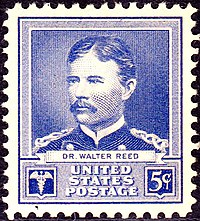검색결과 리스트
의사 에 해당되는 글 1건
- 2012.03.05 Major Walter Reed, M.D.
글
의사
2012. 3. 5. 01:06
Major Walter Reed, M.D.
 Major Walter Reed, M.D., (September 13, 1851 – November 22, 1902) was a U.S. Army physician who in 1900 led the team that postulated and confirmed the theory that yellow fever is transmitted by a particular mosquito species, rather than by direct contact. This insight gave impetus to the new fields of epidemiology and biomedicine, and most immediately allowed the resumption and completion of work on the Panama Canal (1904–1914) by the United States. Reed followed work started by Carlos Finlay and directed by George Miller Sternberg ("first U.S. bacteriologist").The risky but fruitful research work was done with human volunteers, including some of the medical personnel such as Lazear and Clara Maass who allowed themselves to be deliberately infected. The research work with the disease under Reed's leadership was largely responsible for stemming the mortality rates from yellow fever during the building of the Panama Canal, something that had confounded the French attempts to build in that region only 30 years earlier.Although Dr. Reed received much of the credit in history books for "beating" yellow fever, Reed himself credited Dr. Carlos Finlay with the discovery of the yellow fever vector, and thus how it might be controlled. Dr. Reed often cited Finlay's papers in his own articles and gave him credit for the discovery, even in his personal correspondence
Major Walter Reed, M.D., (September 13, 1851 – November 22, 1902) was a U.S. Army physician who in 1900 led the team that postulated and confirmed the theory that yellow fever is transmitted by a particular mosquito species, rather than by direct contact. This insight gave impetus to the new fields of epidemiology and biomedicine, and most immediately allowed the resumption and completion of work on the Panama Canal (1904–1914) by the United States. Reed followed work started by Carlos Finlay and directed by George Miller Sternberg ("first U.S. bacteriologist").The risky but fruitful research work was done with human volunteers, including some of the medical personnel such as Lazear and Clara Maass who allowed themselves to be deliberately infected. The research work with the disease under Reed's leadership was largely responsible for stemming the mortality rates from yellow fever during the building of the Panama Canal, something that had confounded the French attempts to build in that region only 30 years earlier.Although Dr. Reed received much of the credit in history books for "beating" yellow fever, Reed himself credited Dr. Carlos Finlay with the discovery of the yellow fever vector, and thus how it might be controlled. Dr. Reed often cited Finlay's papers in his own articles and gave him credit for the discovery, even in his personal correspondence Following Reed's return from Cuba in 1901, he continued to speak and publish on yellow fever. He received honorary degrees from Harvard and the University of Michigan in recognition of his seminal work.In November 1902, Reed's appendix ruptured; he died on November 22, 1902, of the resulting peritonitis, at age 51. He was buried in Arlington National Cemetery.
Following Reed's return from Cuba in 1901, he continued to speak and publish on yellow fever. He received honorary degrees from Harvard and the University of Michigan in recognition of his seminal work.In November 1902, Reed's appendix ruptured; he died on November 22, 1902, of the resulting peritonitis, at age 51. He was buried in Arlington National Cemetery.


RECENT COMMENT